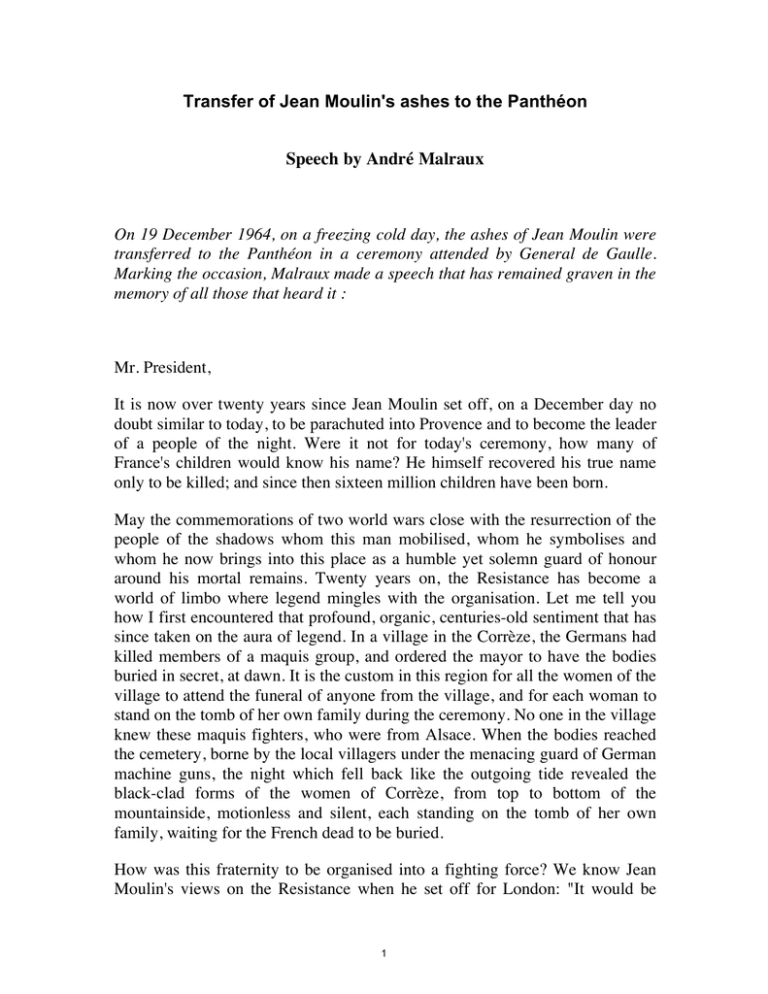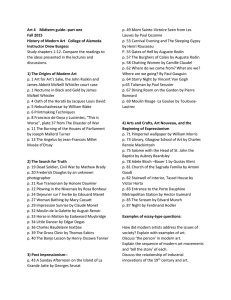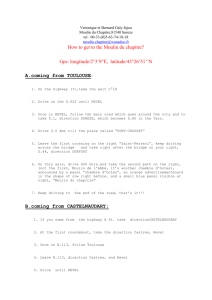Document 13524033
advertisement

Transfer of Jean Moulin's ashes to the Panthéon Speech by André Malraux On 19 December 1964, on a freezing cold day, the ashes of Jean Moulin were transferred to the Panthéon in a ceremony attended by General de Gaulle. Marking the occasion, Malraux made a speech that has remained graven in the memory of all those that heard it : Mr. President, It is now over twenty years since Jean Moulin set off, on a December day no doubt similar to today, to be parachuted into Provence and to become the leader of a people of the night. Were it not for today's ceremony, how many of France's children would know his name? He himself recovered his true name only to be killed; and since then sixteen million children have been born. May the commemorations of two world wars close with the resurrection of the people of the shadows whom this man mobilised, whom he symbolises and whom he now brings into this place as a humble yet solemn guard of honour around his mortal remains. Twenty years on, the Resistance has become a world of limbo where legend mingles with the organisation. Let me tell you how I first encountered that profound, organic, centuries-old sentiment that has since taken on the aura of legend. In a village in the Corrèze, the Germans had killed members of a maquis group, and ordered the mayor to have the bodies buried in secret, at dawn. It is the custom in this region for all the women of the village to attend the funeral of anyone from the village, and for each woman to stand on the tomb of her own family during the ceremony. No one in the village knew these maquis fighters, who were from Alsace. When the bodies reached the cemetery, borne by the local villagers under the menacing guard of German machine guns, the night which fell back like the outgoing tide revealed the black-clad forms of the women of Corrèze, from top to bottom of the mountainside, motionless and silent, each standing on the tomb of her own family, waiting for the French dead to be buried. How was this fraternity to be organised into a fighting force? We know Jean Moulin's views on the Resistance when he set off for London: "It would be 1 insane and criminal, in the event of Allied action on the continent, not to make use of troops prepared for the greatest sacrifices, scattered and unorganised today, but tomorrow capable of making up a united army of parachute troops already in place, familiar with the terrain and having already selected their enemy and determined their objective." Indeed, this was the opinion of General de Gaulle. Nonetheless, when Jean Moulin was parachuted into France on 1 January 1942, the Resistance was still no more than an unstructured body of courage: a clandestine press, a source of intelligence, a conspiracy to gather together troops not yet in existence. The intelligence was destined for this ally or that, the troops would rise as soon as the Allies landed. These fighters were certainly loyal to the Allies. They wanted, however, to cease being French resistance fighters and to become the French Resistance. That is why Jean Moulin went to London. Not only because French combatants were to be found there (these might have been little more than a legion), not only because part of the Empire had rallied to Free France. While he came to ask General de Gaulle for money and arms, he also came seeking "moral support and frequent, rapid, secure links with him". The General at that time was living up to the No uttered on the first day of Free France: continuing the fight, wherever it might be, whatever form it might take; living up to the destiny of France, no less. The strength of the appeals launched in June 1940 lay not so much in the "vast and as yet unused forces" as in the words "France must be present at the victory. Only then will she recover her liberty and her greatness." France, not one particular legion of French fighters. It was through Free France that the heroes of Bir Hakeim came together, forming a Fighting France that continued to fight the war. Each Resistance group could claim its legitimacy from the ally that armed and supported it; or even from its courage aloneGeneral de Gaulle alone could call upon the Resistance movements to unite and to form one with all the other struggles, for it was through him and him alone that France fought her one true combat. That was why - even when President Roosevelt thought he saw only rivalry between generals and parties the army of Africa, from Provence to the Vosges, would fight in the name of Gaullism, as would the troops of the Communist Party. That was why Jean Moulin carried with him, in the false bottom of a box of matches, a microfilm of the following extremely simple order: "Mr. Moulin's task is to bring about, within the zone of metropolitan France not directly occupied, unity of action by all elements resisting the enemy and his collaborators." Unwearyingly, he pointed out to group leaders the danger of the Resistance being torn apart between different influences. Each major event - Russia's entry into the war, then America's, the landings in North Africa - further strengthened his position. In the wake of the landings, it began to seem likely that France would once 2 again become a theatre of operations. The clandestine press and the intelligence service (even when backed up by the infiltration of public services) were geared to Occupation, however, and not to war. Although the Resistance might be well aware that it could not liberate France without the Allies, it was equally aware of the military aid that its unity could contribute to the Allied cause. Gradually the Resistance learned that, while it was relatively easy to blow up a bridge, it was no less easy to repair it; if, however, the Resistance could blow up two hundred bridges, it would be difficult for the Germans to repair them all at once. In short, the Resistance realised that if they were to provide effective aid to Allied armies on landing, they would have to have an overall plan. It was vital that, on every road and on every railway line in France, clandestine groups should methodically disrupt the concentration of German armoured divisions. And such an overall plan could only be devised and executed by a united Resistance. This was the end towards which Jean Moulin toiled, day after day, difficulty after difficulty, from one Resistance movement to another: "And now let us try to calm tempers on the other side…". Inevitably, there were problems of clashing personalities; worse still, there was the poverty of fighting France, the maddening certainty for each maquis or free group that it was being despoiled for the benefit of another group, which in turn was equally prey to the same illusion. Who now can tell what relentless efforts it took to speak the same language to radical or reactionary teachers, to reactionary or liberal officers, to Trotskyists or Communists fresh out of Moscow, all destined for the same deliverance or the same prison; what rigour was required of this supporter of the Spanish Republic, once a "Prefect of the left", driven out by Vichy, to insist that even former members of a secret far-right organisation, the "cagoulards", should be welcomed into the common struggle! Jean Moulin had no need to usurp the glory of others: it was not he who created Combat, Libération, Franc-tireur, it was Frenay, d'Astier, Jean-Pierre Lévy. It was not he who set up the many movements in the northern zone whose names are now remembered in history. It was not he who created the regiments, but it was he that created the army. He was the Carnot of the Resistance. Placing little importance on so-called political opinions, when the nation is in deadly peril - the nation, not a nationalism that had been crushed under the tracks of Hitler's tanks, but that invincible and mysterious given which was to fill the century; believing that the nation would one day soon overcome the totalitarian doctrines ringing through Europe; seeing in the unity of the Resistance the vital means of fighting for the unity of the nation, was perhaps 3 to affirm what has since become known as Gaullism. It was certainly to proclaim the survival of France. By February, this passionate secularist had set up his radio link to London in the attic of a presbytery. By April, the SIP (intelligence and propaganda service) and the Comité Général d'Etudes (formulating post-war policy) had been formed: in September, the infiltration of the public services began. Finally, General de Gaulle decided to create a Coordinating Committee to be headed by Jean Moulin, assisted by the head of the united secret army. The period of prehistory was over. From coordinator of the Resistance in the southern zone, Jean Moulin became its head. In January 1943, the steering committee of the united resistance movements, the Mouvements Unis de la Résistance (which we were all to know as the "Murs" up to the time of the Liberation) was set up under his chairmanship. In February, he returned to London with General Delestraint, commander of the secret army, and Jacques Dalsace. The most moving account of that visit is given by Colonel Passy. "I can still see Moulin, pale, seized by the same emotion that gripped us all, standing a few paces from the General, and the General saying, almost below his breath, "Stand to attention", then "We recognise you as our Companion, for the liberation of France, in honour and through victory". And as de Gaulle embraced him, a single tear, weighted with gratitude, pride and a fierce determination, trickled down the pale cheek of our comrade Moulin. As his head was raised, we could see the traces still visible on his throat of the razor slash he had inflicted on himself in 1940 to avoid giving way under enemy torture." Enemy torture… In March, tasked to set up and chair the National Council of the Resistance, Jean Moulin boarded the plane that was to parachute him into France north of Roanne. This National Council of the Resistance, consisting of the Resistance movements, the parties and the union movements of the whole of France, represented a precariously-achieved unity but also the certainty that, on the day of the landings, the ragged army of the Resistance would be awaiting the armoured divisions of the Liberation. Jean Moulin identified its members, whom he was to gather together with such difficulty. He also found a Resistance tragically altered by circumstances. Until then, the Resistance had fought as an army, facing the prospect of victory, death or captivity. Now it began to discover the world of the concentration camps, the certainty of torture. Now it began to fight in the face of hell. On receiving a report about the concentration camps, Moulin remarked to his 4 liaison agent, Suzette Olivier: "I hope they shoot us first". They would not need to shoot him. The Resistance was gaining in strength; fugitives from the forced labour draft would soon be taking to the maquis. The Gestapo was growing stronger too, and the Milice were everywhere. It was a time when, out in the countryside, we listened tensely to the barking of dogs in the depths of the night; a time when multi-coloured parachutes, laden with weapons and cigarettes, fell from the sky by the light of flares burning in forest clearings or on windswept plateaus; a time of cellars, and the desperate cries of the torture victims, their voices like those of children… The great battle in the darkness had begun. On 27 May 1943, the first meeting of the National Council of the Resistance was held in Paris, in the rue du Four. Jean Moulin restated the aims of Free France: "to prosecute the war; to restore freedom of expression to the French people; to re-establish republican freedoms in a state which incorporates social justice and which possesses a sense of greatness; to work with the Allies on establishing real international collaboration, both economic and social, in a world in which France has regained her prestige." Then he read out a message from General de Gaulle, assigning the first Council of the Resistance its primary goal: to maintain the unity of the Resistance it represented. Each of its members went in daily peril of his life. On 9 June, General Delestraint, commander of the secret army, unified at last, was taken prisoner in Paris. There was no obvious successor, as so often happens in the secret world. Before the arrival of Serreules, Jean Moulin said on many occasions, "Had I been captured, I would not even have had time to brief a deputy…". He wanted the appointment of a successor to be made with the agreement of the Resistance movements, particularly those in the south. He was to meet their representatives on 21 June, in Caluire. They were waiting for him. So, too, was the Gestapo. 5 Treason played its part - as did destiny, which made the normally punctual Jean Moulin three quarters of an hour late, only to be matched by the tardiness of the German police. Soon enough, they learned that they had captured the head of the Resistance. Little good it did them. In the Montluc fort in Lyons, on the day that the Gestapo agent handed him writing materials because torture had left him unable to speak, Jean Moulin sketched a caricature of his torturer. As for what followed, let us turn to the stark words of his sister: "His part was played, and his ordeal began. Jeered at, savagely beaten, his head bleeding, his internal organs ruptured, he attained the limits of human suffering without betraying a single secret, he who knew everything." Let us be quite clear that, for the days in which he was still able to speak or write, the fate of the whole Resistance hung on the courage of this one man. As Mademoiselle Moulin put it, he knew everything. Georges Bidault took his place. But now came the victory of a silence for which such an atrocious price was paid: the wheel of fortune turned. Leader of the Resistance martyred in hideous cellars, behold through eyes now closed for ever all these black-clad women who watch over our companions: they are in mourning for France, and for you. Behold the dwarf oak forests of Quercy through which, under a flag made from knotted strips of muslin, flit members of the maquis that the Gestapo will never find because it believes only in tall trees, not those closer to the earth. Behold the prisoner who enters the luxury villa and wonders why he has been provided with a bathroom - he has yet to hear of the bath torture. Poor tortured king of shadows, behold your people of shadows rise up in the June night disfigured by torture. Hear the roar of the German tanks, racing back towards Normandy, over the plaintive cries of sheep and cattle disturbed by their passing: thanks to you, the tanks will arrive too late. And, Prefect, as the Allied breakthrough begins, see the commissioners of the republic rise up from every town and city in France all those that have not been killed. Like us, you envied Leclerc's epic tramps: now, Resistance fighter, behold your ragged tramps crawl from their forest hiding-places, laying their farmers' hands to bazookas to bring to a halt one of the finest armoured divisions of Hitler's empire, the Das Reich division. As Leclerc entered the Invalides with his cortège of honour from the hot suns of Africa and the battles of Alsace, enter now, Jean Moulin, with your terrible cortège. With all those who, like you, died in the cellars without breaking; or even, perhaps more atrocious still, those who did break; with all those in the 6 striped garb and shaven heads of the concentration camps, with the last stumbling body from the monstrous lines of Night and Fog, falling prey at last to the rifle-butts; with the eight thousand French women that never returned from the prisons, with the last woman who died in Ravensbrück for having sheltered one of ours. Enter here, accompanied by a people born of the shadow and who disappeared with that shadow - our brothers in the order of the Night. Commemorating the anniversary of the Liberation of Paris, I said, "Listen tonight, you the young people of my country, listen to these anniversary bells that will ring as they did fourteen years ago. May you hear them on this occasion: they will ring for you." The accompaniment most fitted to today's tribute is the song that will now be sung, the song of the partisans that I have heard murmured like a chant of complicity, then intoned in the mists of the Vosges and the woods of Alsace, mingling with the lost cries of the hill-sheep as the bazookas of the Corrèze advanced against von Rundstedt's tanks, turned once more on Strasbourg. Young people of France, listen today to what was for us the song of misfortune. It is the funeral march of these ashes you see before you. Alongside those of Carnot with the soldiers of the Year II, those of Victor Hugo with his Misérables, and those of Jaurès under the guardian eye of justice, may they rest here with their long cortège of disfigured shadows. Today, young people of France, may you think of this man as you would have reached out your hands to his poor, unrecognisable face on that last day, to those lips that never let fall a word of betrayal: on that day, his was the face of France… (19 December 1964.) 7 MIT OpenCourseWare http://ocw.mit.edu 21G.053 Understanding Contemporary French Politics Spring 2014 For information about citing these materials or our Terms of Use, visit: http://ocw.mit.edu/terms.




